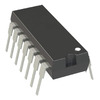Manufacturer Part Number
MCP6544T-I/ST
Manufacturer
Microchip Technology
Introduction
MCP6544T-I/ST is a quad comparator from Microchip Technology designed for low-power applications.
Product Features and Performance
General Purpose Comparator
Includes four independent precision voltage comparators
CMOS, Push-Pull, Rail-to-Rail, TTL output type
Low input offset voltage
Extremely low input bias current
High Common-Mode Rejection Ratio (CMRR)
High Power Supply Rejection Ratio (PSRR)
Fast Propagation Delay
Product Advantages
Energy-efficient due to low current consumption
Versatile use with rail-to-rail output
Wide operating voltage range suitable for battery-operated devices
High integration with four elements in a single package
Key Technical Parameters
Number of Elements: 4
Voltage - Supply, Single/Dual (±): 1.6V ~ 5.5V
Voltage - Input Offset (Max): 7mV @ 5.5V
Current - Input Bias (Max): 1pA @ 5.5V
Current - Quiescent (Max): 1µA
Propagation Delay (Max): 8µs
Hysteresis: 6.5mV
Quality and Safety Features
70dB CMRR, ensuring accuracy in the presence of common-mode noise
80dB PSRR, provides stable operation with varying power supply conditions
Compatibility
Push-Pull, Rail-to-Rail, TTL compatible outputs allow for interfacing with a wide range of digital components
Surface Mount, 14-TSSOP package for integration into various circuit board designs
Application Areas
Battery powered devices
Sensing & detection systems
Data acquisition systems
Consumer electronics
Portable medical devices
Product Lifecycle
Active Product Status
Availability of product assured with potential for long-term support
Replacements or upgrades might be available
Several Key Reasons to Choose This Product
Ultra-low power consumption enhancing battery life
High integration reducing space requirements on PCB
Suitable for high-precision applications with low input bias and offset voltage
Can be used across a wide range of temperatures, from -40°C to 85°C
Robust design with high noise immunity due to CMRR and PSRR features
Fast response time with 8µs propagation delay




 MCP6546RT-I/OTMicrochip TechnologyIC COMPARATOR 1 GEN PUR SOT23-5
MCP6546RT-I/OTMicrochip TechnologyIC COMPARATOR 1 GEN PUR SOT23-5 MCP6544-I/PMicrochip TechnologyIC COMPARATOR 4 GEN PUR 14DIP
MCP6544-I/PMicrochip TechnologyIC COMPARATOR 4 GEN PUR 14DIP MCP6546-E/SNMicrochip
MCP6546-E/SNMicrochip MCP6546T-I/LTMicrochip TechnologyIC COMPARATOR 1 GEN PUR SC70-5
MCP6546T-I/LTMicrochip TechnologyIC COMPARATOR 1 GEN PUR SC70-5